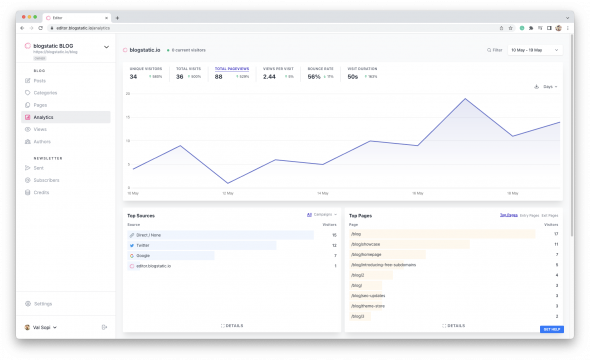This post is written by Mr Michael an entrepreneur who runs bootstrapped businesses.
I use blogstatic when I am looking to validate business ideas and growth channels that lean heavily on SEO.
I run a fancy software development and brand agency in London. We could build a beautifully stylised blog and CMS to accompany it. And yet we use blogstatic to host our company blog.

Why do we use blogstatic?
Our blog in practice, is hosted with blogstatic.
Why do this? With blogstatic it's super quick to get signal, which is what busy entrepreneurs need.
As an agency, instead of pondering whether we should invest in SEO, a sales team, or other distribution channels (nothing gets done), we can use blogstatic, get writing and see if it drives any meaningful traffic.
No need to debate things in theory, or spend thousands on hiring sales candidates.
In the case of building our company blog, we need to have it designed, written up in Next or React, and then go through a tedious QA process of ensuring the page is SEO optimised.
Why bother, when I don't even know if it will drive volume? Why not get it live in 5 minutes, write content, see if it gets traffic, and leave the re-design for another day?
Real–life examples
My name is Michael. I’m an entrepreneur who does not want (or have) VC money to burn through.
The game I play is to validate ideas quickly – either a business or a distribution channel – and move on (or double down).
The rest of the post is not about the agency, but other MVP ideas and early projects that I've used blogstatic for.
As mentioned above, I want to know whether I can get an audience before investing too much in building the product, content or service. Distribution first. One way to do this is with SEO, as this is an area I know.
A project I launched last year is BeCivil, a lawyer search tool for people in the UK. 80% of its search traffic is SEO, and that traffic mostly comes in via a blog hosted by blogstatic. Nice work :) That has taken the distribution question out of my mind.
My job is simply to post content on the blog and ensure Google/Bing indexes it. blogstatic has perfect SEO configurations out of the box for an MVP of this kind. With a little keyword research (and knowing my niche) I can launch a website and find traffic – the rest is down to funnels and having a service to sell…
Result? MVP works ✅
Next example: Flamenco With Rafael offers people a course to learn flamenco guitar online from a lifelong guitar maestro (who happened to teach Radiohead’s guitarist!)
Despite these cool creds, Rafael had little pre-existing audience, being from the pre-internet era of VHSs and CDs. Ads aren't great for online courses, and I'm not a social media guy. Therefore the main driver of our site’s audience is organic search. Using our blogstatic instance, I can publish posts and discover whether search engines are happy to serve the site in the search results — for queries like "what is the best flamenco guitar" or "classical vs flamenco guitar". If it does, we’re back to marketing funnels and compelling offers, and if those can be pulled off at scale, we’re in an interesting business.

I offer one last example that goes in the opposite direction: in 2023 a friend and I were experimenting with capturing search traffic for vitamin supplements offered by Spanish supermarkets. SEO keyword research tools suggested high volumes of traffic with no competition were up for grabs. So we set up a blogstatic blog over at bellezalab.es to see if we’d get any traffic. Maybe we could sell our own supplement if we had an audience that scaled easily.
But in this case, the site was not appearing on Google search in any interesting way. So we killed it.
Think of the money and time saved – it took only hours to set up the blog and create content – instead of building a hypothetical product (a competitor supplement) which would easily go into the months and thousands of investment.
The same methodology – using blogstatic to validate search demand when distributing a product – can be applied to sectors that are not so niche (I am unfortunate to pick niche ones, like learning flamenco guitar, but hey, you don't pick your passions).
Here are some keywords that are higher volume (scaling to hundreds of thousands) and apparently not too competitive.
I say apparently. Always DYOR; SEO and metrics like competitiveness [in the green boxes] are deeper than they look ;) When your blogstatic website is getting the actual traffic then you know it works.
While I could use WordPress to validate MVPs – and I have tried – it’s also fiddly, slow, and full of bloatware. But it’s fine. Most of the internet is powered by WordPress. But it wouldn’t hurt to have some more sites powered by blogstatic. Especially for ones that rely on content.
For people playing the programmatic SEO game, you'll probably find you need something more customised, but for validating content businesses quickly, blogstatic is the place to be.
I compare it to using an Apple computer. Simply a much more joyful experience. For $49/year I am very happy. SEO works better out of the box, the site is faster. Notably, my blogstatic SEO tests have mostly worked, and the WordPress ones generally have not ?
Publish your SEO–driven content!
Visit BlogMaker.app






